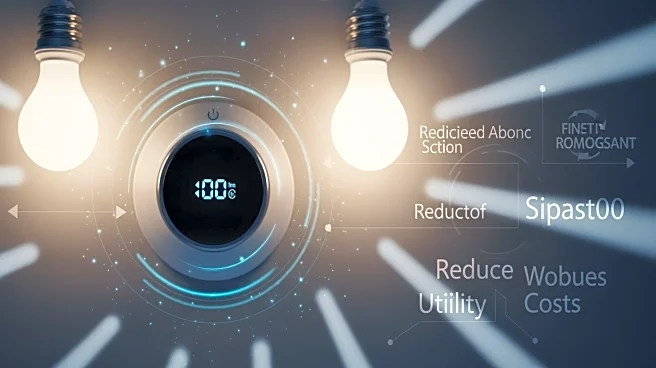What's Happening?
A recent article highlights the benefits of smart thermostats and energy-saving practices in reducing household utility costs. Smart thermostats offer features such as remote app controls, scheduling, and presence sensing, which adjust the home's temperature
based on activity patterns to save energy. Additionally, unplugging appliances that are not in use can significantly reduce 'phantom load,' the energy consumed by devices even when turned off. According to the Department of Energy, standby power accounts for 5% to 10% of residential energy use. The Natural Resources Defense Council estimates that reducing the load from always-on devices could save consumers $8 billion annually and prevent 44 million metric tons of carbon dioxide pollution.
Why It's Important?
The adoption of smart thermostats and energy-saving practices is crucial for both economic and environmental reasons. By reducing energy consumption, households can lower their utility bills, which is increasingly important as energy costs rise. The environmental impact is also significant, as reducing energy use contributes to lower carbon emissions, helping to combat climate change. Consumers stand to gain financially from these practices, while society benefits from reduced environmental impact. The widespread implementation of these technologies and habits could lead to substantial savings and environmental benefits on a national scale.
What's Next?
As awareness of energy-saving technologies grows, more households may invest in smart thermostats and adopt energy-efficient practices. This could lead to increased demand for energy-efficient products and services, encouraging innovation and competition in the market. Utility companies and policymakers might also promote these technologies through incentives or regulations to further drive adoption. The long-term shift towards energy efficiency could result in significant reductions in national energy consumption and carbon emissions.
Beyond the Headlines
The move towards energy efficiency raises ethical considerations regarding consumer privacy and data security, as smart devices often collect and transmit data. Ensuring that these technologies are secure and that consumer data is protected will be essential as adoption increases. Additionally, the transition to energy-efficient practices may require cultural shifts in consumer behavior, emphasizing the importance of education and awareness campaigns.















